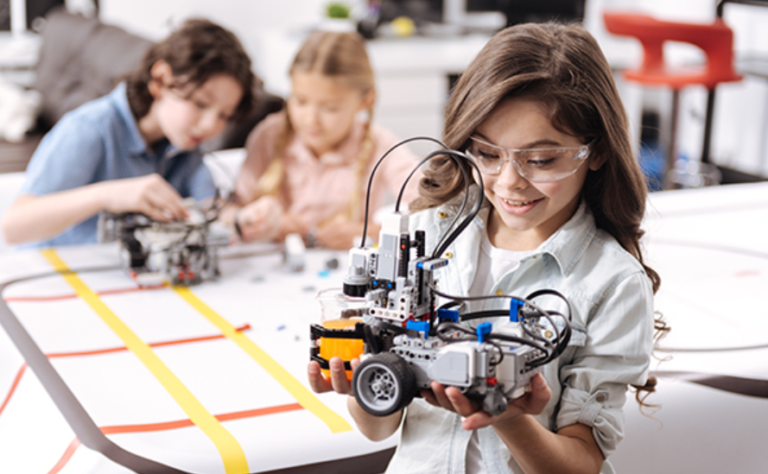Top 10 Tech Innovations to Watch in 2025

The tech landscape is on the brink of significant transformation by 2025. Innovations in artificial intelligence and quantum computing promise to reshape industries. Meanwhile, immersive virtual and augmented reality will create new experiences. Sustainable technology solutions are emerging, driven by environmental concerns. As connectivity evolves with 5G, the implications for urban mobility and security are profound. These trends signal a future that is not only advanced but also complex. What will this mean for everyday life?
Artificial Intelligence Advancements
As the world approaches 2025, advancements in artificial intelligence (AI) are poised to reshape various sectors, influencing everything from healthcare to finance.
Central to this transformation are discussions around machine learning ethics and AI transparency. Stakeholders acknowledge that while AI can enhance efficiency and decision-making, ethical considerations must guide its deployment to ensure that algorithms do not perpetuate biases.
Transparency in AI systems is essential to build trust and accountability, allowing users to understand how decisions are made. The call for ethical frameworks is growing stronger, as individuals demand that AI serves humanity’s best interests, empowering rather than restricting freedom.
As AI continues to evolve, the intersection of ethics and transparency will be pivotal in shaping its future impact on society.
Quantum Computing Breakthroughs
As the world approaches 2025, quantum computing is poised to revolutionize the landscape of technology with its enhanced computational power.
This breakthrough not only promises to solve complex problems previously deemed insurmountable but also opens new avenues for innovation across various fields.
The implications of these advancements could fundamentally alter industries from pharmaceuticals to cryptography, making it a crucial area of focus.
Read more: The Impact of Artificial Intelligence on Everyday Life
Enhanced Computational Power
Quantum computing is on the cusp of a transformative breakthrough, poised to revolutionize computational power in unprecedented ways. This emerging technology promises enhanced computational efficiency through its ability to perform complex calculations at lightning speed.
By harnessing the principles of quantum mechanics, quantum computers can execute parallel processing, allowing them to tackle multiple computations simultaneously. This capability far surpasses traditional computing methods, which rely on sequential processing.
As advancements continue, industries from cryptography to pharmaceuticals will benefit from the immense potential of quantum systems. Ultimately, the rise of enhanced computational power will not only accelerate innovation but also empower individuals and organizations to explore new frontiers in data analysis, artificial intelligence, and beyond, fostering a landscape of unprecedented freedom and creativity.
Revolutionary Problem Solving
The advancements in quantum computing are paving the way for revolutionary problem-solving capabilities that were once deemed unattainable. As researchers continue to unlock quantum mechanics’ potential, the development of disruptive solutions emerges, transforming how complex problems are approached.
Innovative methodologies leveraging quantum algorithms allow for unprecedented speed in data processing and analysis, enabling breakthroughs in fields such as cryptography, pharmaceuticals, and climate modeling. This transformation not only enhances computational power but also democratizes access to cutting-edge technology, fostering an environment of creativity and exploration.
The shift towards quantum computing represents a paradigm change, granting freedom to scientists and innovators to tackle issues previously constrained by classical computational limits, ultimately reshaping our understanding of what is possible.
Immersive Virtual and Augmented Reality
Immersive virtual and augmented reality technologies are poised to transform user experiences across various sectors by blending digital content with the physical world.
As these innovations gain traction, they promise to unlock real-world applications that extend beyond gaming, impacting fields such as education, healthcare, and remote collaboration.
Enhanced User Experiences
As technology continues to evolve, the integration of virtual and augmented reality is poised to redefine user experiences across various sectors.
Enhanced user experiences will rely heavily on personalized interfaces, allowing individuals to tailor their interactions according to personal preferences and needs. This customization fosters a sense of ownership and freedom, enhancing user engagement.
Moreover, intuitive navigation within these immersive environments will simplify complex tasks, making technology more accessible to diverse audiences. By eliminating barriers and streamlining interactions, users can seamlessly transition between digital and physical realms.
As these innovations unfold, they promise not only to enrich entertainment but also to revolutionize education, healthcare, and other industries, ultimately creating a more interconnected and user-friendly world.
Real-World Applications
While many envision virtual and augmented reality primarily as tools for entertainment, their real-world applications are rapidly expanding across diverse sectors.
In smart agriculture, these technologies enable farmers to visualize crop conditions and optimize resource use, fostering sustainable practices and enhancing yield. Augmented reality applications assist in real-time monitoring, allowing for timely interventions.
In the realm of digital education, immersive environments transform learning experiences, making complex subjects more engaging and accessible. Students can explore historical sites or conduct virtual science experiments, breaking geographical barriers.
As these innovations continue to evolve, they promise to empower individuals and industries alike, creating opportunities for enhanced productivity and creativity in an increasingly interconnected world.
Future of Gaming
The future of gaming is poised for a revolutionary transformation, driven by advancements in virtual and augmented reality technologies.
Cloud gaming will ensure seamless access to high-quality experiences, while game streaming will foster dynamic player communities.
Virtual tournaments and eSports evolution will provide platforms for competitive play, encouraging cross-platform play and inclusivity.
Immersive storytelling combined with interactive narratives will captivate players, enhancing their emotional investment in games.
AI game design will introduce adaptive difficulty, tailoring challenges to individual skill levels and preferences.
As these innovations converge, they promise to reshape the gaming landscape, empowering players to explore limitless possibilities and engage in richer, more diverse gaming experiences that transcend traditional boundaries.
Sustainable Tech Solutions
With environmental concerns escalating, the demand for sustainable tech solutions has never been more critical. Innovations in renewable energy, such as solar and wind technologies, are leading the charge toward a greener future.
The use of eco-friendly materials in manufacturing is essential for reducing waste and promoting a circular economy. Furthermore, advancements in sustainable agriculture enhance food production while conserving water and minimizing environmental impact.
Green transportation options, including electric vehicles, are crucial for energy efficiency and reducing carbon footprints. In packaging, sustainable methods are gaining traction, aligning with waste reduction goals.
These technologies collectively embody a commitment to preserving the planet, ensuring that freedom from environmental degradation becomes a tangible reality for future generations.
5G and Beyond: Connectivity Revolution
As the world looks toward 2025, the connectivity landscape is poised for a transformative shift with the advent of advanced mobile technologies.
This evolution not only promises an enhanced mobile experience but also catalyzes the expansion of the Internet of Things (IoT), enabling seamless communication between devices.
Furthermore, the integration of smart city initiatives stands to revolutionize urban living, making cities more efficient, sustainable, and connected than ever before.
Enhanced Mobile Experience
Although the evolution of mobile technology has consistently shaped communication and connectivity, the advancements expected in 2025 promise to redefine the user experience entirely.
As 5G and beyond expand, users can anticipate seamless mobile payment solutions that enhance convenience and security in transactions. This shift will empower users with the freedom to conduct financial activities effortlessly, bridging gaps in accessibility.
Furthermore, augmented reality applications will transform daily interactions by blending the digital and physical worlds, offering immersive experiences in shopping, education, and entertainment. These innovations will not only foster greater engagement but also promote a more intuitive understanding of surrounding environments.
Ultimately, the enhanced mobile experience in 2025 will prioritize user autonomy while enriching connectivity in unprecedented ways.
Internet of Things Expansion
The Internet of Things (IoT) is poised for remarkable expansion in 2025, driven by advancements in connectivity technologies such as 5G and future iterations.
This evolution will significantly enhance smart home integration, allowing devices to communicate seamlessly, providing users with unprecedented control and customization. Homeowners will enjoy heightened convenience through interconnected appliances that adapt to individual preferences and routines.
Additionally, wearable devices will become increasingly integral, monitoring health metrics and enhancing daily activities by connecting to smart home systems.
As these innovations unfold, they will not only improve quality of life but also empower individuals to make informed decisions, fostering a sense of autonomy.
The synergy between smart homes and wearables will redefine personal freedom in an increasingly connected world.
Smart City Integration
While cities around the globe increasingly adopt smart technologies, the integration of these innovations is expected to transform urban life significantly by 2025.
Smart infrastructure, including interconnected sensors and data analytics, will enhance urban mobility by streamlining traffic flow and optimizing public transportation systems. This integration will allow for real-time responses to congestion, improving access and reducing travel times.
Moreover, smart city initiatives are likely to promote sustainable practices through energy-efficient designs and waste management systems. As cities embrace this connectivity revolution, residents will experience heightened convenience and safety, fostering a sense of community.
Ultimately, the seamless amalgamation of smart technologies will empower citizens, granting them greater autonomy in navigating their urban environments while fostering a more dynamic, responsive cityscape.
Autonomous Transportation Innovations
As advancements in artificial intelligence continue to reshape various industries, the realm of autonomous transportation stands at the forefront of technological innovation.
Self-driving vehicles are not merely a vision of the future; they are rapidly becoming a reality, promising to revolutionize urban mobility. These innovations address pressing issues such as traffic congestion and environmental sustainability, offering citizens a newfound sense of freedom in transportation.
With the integration of advanced sensors and machine learning, self-driving vehicles navigate complex urban environments with increasing precision and safety.
Furthermore, as cities adapt to these technologies, they are poised to enhance public transportation systems, providing seamless connectivity.
Ultimately, the growth of autonomous transportation holds the potential to transform the way individuals experience mobility in urban landscapes.
Biometric Security Enhancements
With the increasing prevalence of cyber threats and identity theft, biometric security enhancements are emerging as a crucial line of defense in safeguarding personal and organizational data.
Technologies such as facial recognition, fingerprint authentication, and voice verification are being integrated into security systems to create robust multi-factor security protocols. Iris scanning adds another layer of protection, while behavioral biometrics continuously analyze user patterns for anomalies.
Biometric encryption ensures that sensitive information remains secure, even if intercepted. Furthermore, contactless access technologies and biometric wearables are revolutionizing convenience without compromising security.
As concerns about security privacy grow, these advancements offer individuals a sense of freedom, enabling them to navigate increasingly digital environments with confidence and safety.
Health Tech Transformations
Health tech transformations are poised to redefine patient care and streamline healthcare delivery in the coming years.
With the proliferation of wearable devices, individuals can now monitor their health in real-time, empowering them to take charge of their well-being.
Telehealth services are expanding access, allowing patients to connect with healthcare providers remotely.
Personalized medicine is revolutionizing treatment plans, while digital therapeutics offer innovative solutions for chronic conditions.
Health data analytics and AI diagnostics enhance decision-making, fostering proactive approaches to health.
Remote monitoring and virtual health assistants facilitate continuous care, promoting health equity initiatives.
Additionally, preventive care technologies are set to shift the focus from reactive to proactive health management, ensuring a healthier future for all.
Blockchain and Decentralized Finance
The advancements in health technology have paved the way for innovations in other sectors, notably in blockchain and decentralized finance (DeFi).
This emerging landscape promotes an unprecedented level of freedom by eliminating intermediaries through decentralized applications (dApps) and smart contracts. As users gain more control over their financial transactions, traditional banking systems face disruption.
DeFi offers transparent, secure, and efficient financial services, enabling individuals to lend, borrow, and trade assets without relying on centralized authorities. The potential for enhanced financial inclusivity is significant, particularly for underserved populations.
As blockchain technology matures, it fosters trust and accountability, further encouraging the adoption of decentralized solutions. By 2025, these innovations will likely reshape the financial ecosystem, promoting autonomy and democratizing access to financial resources.
Robotics and Automation Evolution
Robotics and automation are poised for unprecedented evolution in the coming years, fundamentally transforming industries and daily life. Innovations such as robotic process automation will streamline operations, enhancing efficiency across sectors.
Humanoid robots and collaborative robots are set to work alongside humans, improving productivity and safety. In healthcare, robotic surgery advancements promise greater precision, while warehouse automation systems will revolutionize logistics.
Drone delivery services are on the rise, facilitating quicker access to goods. The deployment of service robots in hospitality and retail will redefine customer interaction.
Agricultural robotics will optimize farming practices, and robotic exoskeletons will assist in rehabilitation. Furthermore, soft robotics applications will enable delicate manipulation, enhancing automation’s scope and versatility, ultimately granting individuals more freedom in their daily activities.
Conclusion
As the tech landscape evolves by 2025, the convergence of these innovations will reshape everyday life. For instance, a projected 50 billion connected devices will populate the Internet of Things, illustrating the depth of connectivity enhancements. These advancements—from artificial intelligence to sustainable solutions—promise not only to streamline daily tasks but also to foster a greener, more efficient world. Embracing these technologies will be crucial for individuals and businesses alike, as they navigate the complexities of a rapidly changing environment.





